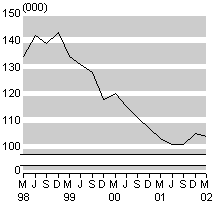
OFFICIAL RATE OF UNEMPLOYED
March 2002 seasonally adjusted
5.3%
OR ONE IN 19 PEOPLE
DROP IN NUMBER OF UNEMPLOYED
IN LAST THREE
MONTHS
Dec 2001 to March 2002
1,000 people
.
RISE IN NUMBER OF UNEMPLOYED
IN THE LAST YEAR
March 2001 to March 2002
1,000 people
Source — Statistics NZ
OFFICIALLY UNEMPLOYED IN THE REGIONS
March 2002 |
| NORTHLAND |
10.5% |
or one in 10 people |
| AUCKLAND |
4.9% |
or one in 20 people |
| WAIKATO |
6.1 |
or one in 16 people |
| BAY OF PLENTY |
7.2% |
or one in 14 people |
| GISBORNE - HAWKES BAY |
4.9% |
or one in 20 people |
| TARANAKI |
4.9% |
or one in 20 people |
| WANGANUI - MANAWATU |
6.2% |
or one in 16 people |
| WELLINGTON |
5.8% |
or one in 17 people |
| NELSON - MARLBOROUGH TASMAN - WEST COAST |
3.5% |
or one in 29 people |
| CANTERBURY |
5.5% |
or one in 18 people |
| OTAGO |
6.5% |
or one in 15 people |
| SOUTHLAND |
3.7% |
or one in 27 people |
| Source — Statistics NZ |
REGIONS WITH A DROP IN UNEMPLOYMENT
IN THE LAST THREE MONTHS
Dec 2001 to March 2002
Gisborne/Hawkes Bay
Bay of Plenty
Taranaki
Nelson/Marlborough/
Tasman/West Coast
Southland
REGIONS WITH NO CHANGE IN UNEMPLOYMENT
None
REGIONS WITH A RISE IN UNEMPLOYMENT
Northland
Auckland
Waikato
Wanganui/Manawatu
Wellington
Canterbury
Otago
Registrations at Winz
(Ministry of Social Development)
PEOPLE REGISTERED AS JOB SEEKERS
WITH MINISTRY OF SOCIAL DEVELOPMENT
March 2002
173,280
NOTIFIED VACANCIES
for month of March 2002
Figures Unavailable
Source — Ministry of Social Development
The Underemployed
March 2002
106,600 people
According to Statistics NZ, the underemployed are workers who are employed part time but would prefer to work more hours
The Employed
NUMBER OF PEOPLE IN JOBS IN NEW ZEALAND
March 2002 seasonally adjusted
1,867,000 people
RISE IN THE NUMBER OF PEOPLE IN JOBS IN LAST 3 MONTHS
Dec 2001 to March 2002
24,000
RISE IN THE NUMBER OF PEOPLE IN JOBS IN LAST YEAR
March 2001 to March 2002
63,000 people
SECTORS WITH A RISE IN EMPLOYMENT IN LAST YEAR
Wholesale & Retail Trade, Agriculture, Forestry & Fishing, Construction, Transport, Storage & Communication, Business & Financial, Education, Health & Community Services,
SECTORS WITH A DROP IN EMPLOYMENT IN LAST YEAR
Manufacturing
Full-time and Part-time
GAIN IN FULL-TIME EMPLOYED
IN THE PAST YEAR
March 2001 to March 2002
30,000 people
Full Time Employment
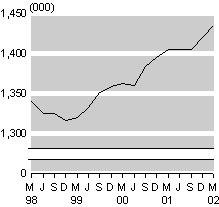
GAIN IN PART-TIME EMPLOYED
IN THE PAST YEAR
March 2001 to March 2002
14,000 people
Part Time Employment
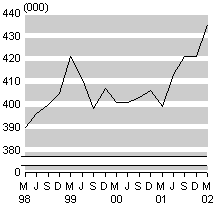
| ... |
Full-time |
Part-time |
|
Men |
910,000 (89%) |
117,300 (11%) |
|
Women |
541,900 (64%) |
300,700 (36%) |
|
Total |
1,451,900 |
418,100 |
|
Overall % |
78% |
22% |
| Source — Statistics NZ |
Global Unemployment Rates
SPAIN
12.9%
FRANCE
9.1%
ITALY
9.0%
GERMANY
8.1%
CANADA
7.7%
OECD AVERAGE
7.0%
AUSTRALIA
6.3%
UNITED STATES
6.0%
NEW ZEALAND
5.3%
JAPAN
5.2%
BRITAIN
5.0%
Officially Jobless
"Those without a job
and wanting a job ..."
These are the statistics that are more commonly used
by community workers and employment activists in New
Zealand because they more accurately reflect the
people who are their concern or clients.
These "Jobless" figures are also based on the
Household Labour Force Survey run by Statistics NZ,
but include a wider definition of unemployment,
usually referred to "those without a job and wanting
a job".
ONE IN ELEVEN PEOPLE OFFICIALLY JOBLESS IN NZ
According to Statistics NZ, the difference between
the official "unemployment" figures and the "jobless
figures" is that many of the people on the jobless
measurement are available for work, but not actively
seeking it.
The reasons for not actively seeking work range from
people being discouraged because they lack the skills
needed, or were the wrong age, or that the right work
was not available in their area, or they were only
looking for jobs in their newspaper. This measurement
also includes those actively seeking work but not yet
available for it.
OFFICIAL NUMBER OF JOBLESS IN NZ
March 2002
188,500 people
OFFICIAL RATE OF JOBLESS
March 2002
9.2%
OR ONE IN 11 PEOPLE
RISE IN NUMBER OF JOBLESS
IN LAST THREE
MONTHS
Dec 2001 to March 2002
4,900
RISE IN NUMBER OF JOBLESS
IN THE LAST YEAR
March 2001 to March 2002
9,700 people
Source — Statistics NZ
JOBLESS IN THE REGIONS
March 2002 |
| NORTHLAND |
17.5% |
or one in 6 people |
| AUCKLAND |
8.6% |
or one in 12 people |
| WAIKATO |
8.7% |
or one in 11 people |
| BAY OF PLENTY |
11.7 |
or one in 9 people |
| GISBORNE - HAWKES BAY |
8.6% |
or one in 12 people |
| TARANAKI |
8.8% |
or one in 11 people |
| WANGANUI - MANAWATU |
9.2 |
or one in 11 people |
| WELLINGTON |
8.8% |
or one in 11 people |
| NELSON - MARLBOROUGH TASMAN - WEST COAST |
6.8% |
or one in 15 people |
| CANTERBURY |
9.3% |
or one in 11 people |
| OTAGO |
9.9% |
or one in 10 people |
| SOUTHLAND |
6.7% |
or one in 15 people |
| Source — Statistics NZ |
Labour Force Participation Rate
LABOUR FORCE PARTICIPATION RATE
March 2002
66.9%
Labour Force Participation Rate
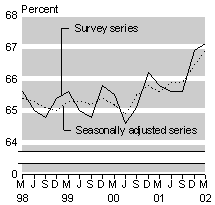
Source — Statistics NZ
Race / Ethnic
MAORI RATE OF UNEMPLOYMENT
March 2002
10.8%
or one in 9 Maori people
PACIFIC ISLAND RATE OF UNEMPLOYMENT
March 2002
9.7%
or one in 10 Pacific Island people
NZ EUROPEAN (PAKEHA) RATE OF UNEMPLOYMENT
March 2002
4.2%
or one in 24 NZ European (Pakeha) people
Unemployment Rate
By Ethnic Group
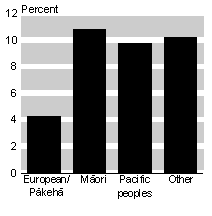
Source — Statistics NZ
Age Rates and Long-term Unemployment
YOUTH UNEMPLOYMENT RATE
-- AGED 15-19 YEARS
March 2002
16.0%
or one in 6 young people
MATURE UNEMPLOYMENT RATE
-- AGED 50-65 YEARS
March 2002
3.9%
or one in 26 mature people
LONG-TERM UNEMPLOYED (over 6 months)
March 2002
27,200 people
26% or one in 4 of the unemployed
LONGER-TERM UNEMPLOYED (over 2 years)
March 2002
7,100 people
7% or one in 15 of the unemployed
VERY LONG-TERM UNEMPLOYED (over 5 years)
March 2002
1,900 people
2% or one in 55 of the unemployed
Source — Statistics NZ
The Schemes and Subsidised Jobs
|
TASKFORCE GREEN |
790 |
|
JOB PLUS |
4,378 |
|
JOB PLUS MAORI |
153 |
|
JOB CONNECTION |
184 |
|
ENTERPRISE ALLOWANCE |
61 |
ENTERPRISE ALLOWANCE
with capitalisation |
200 |
TRAINING OPPORTUNITY PROGRAMME
(TOPS) COURSES) |
7,784 people |
|
YOUTH TRAINING (SKILL NZ ) |
5,211 people |
LIMITED SERVICE VOLUNTEERS
(Army) |
150 people |
|
CONSERVATION CORPS |
1,363 people |
|
YOUTH SERVICE CORPS |
237 people |
ACTIVITY IN THE COMMUNITY
(still counted as unemployed) |
1,612 |
Source — figures from Ministry of Social Development (formerly Work & Income NZ), Skill NZ and Youth Affairs




